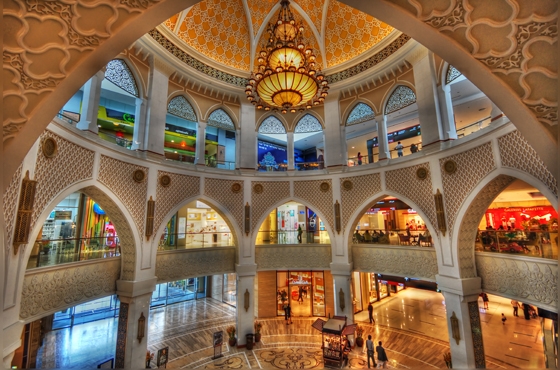With its shopping scene dominated by mega malls and shopping complexes, Dubai easily takes the cake as the region’s leading retail destination.
A new Colliers International report released this week showed that Dubai has more shopping space per person than any other market in the region, with its supply topping 2.5 million square meters of gross leasable area (GLA), the highest among major markets. Dubai’s retail space has recently expanded by 2 per cent from last year, following the opening of City Walk and the expansion of Al Ghurair Centre.
Colliers’ report looks at the key undercurrents shaping the retail markets within the Middle East and North Africa (Mena) region, and provides a quick look at seven major cities that are considered “the most active and promising”.
Based on the report, Dubai’s close competitor in terms of shopping space is Riyadh in Saudi Arabia, which has an estimated GLA amounting to 1.5 million square meters. Following closely behind is Jeddah, with 1.1 million square meters.
Abu Dhabi, another major contender in the shopping scene, came fourth on the list, with 921,400 square meters. Cairo, which has 861,000 square meters of floor space for rent to retailers, came fifth, followed by Doha (620,000) and Muscat (131,084).
Global property adviser CBRE earlier this year ranked Dubai as the second most important destination for retailers in the world, with London occupying the top spot. The report also named Dubai as the fourth “hottest” retail market in the world.
According to Colliers, the shopping mall space in Dubai will expand further by 369,000 square meters by the end of 2015, provided that the projects in the pipeline, such as The Pointe at Palm Jumeirah Cresent, The Beach at Jumeirah Beach Residence, and the expansion of Dubai Mall, will be completed as planned.
However, while the retail scene looks buoyant, there appears to be an oversupply of shopping space, if only the size of the population is taken into account. Dubai’s shopping space currently stands at 1.35 square meters per person, compared to 0.97 in Doha or 0.77 in Abu Dhabi.
Stuart Gissing, Colliers International regional director for the Middle East, explained that the oversupply is based on “normal benchmarking” and it shows only when the retail per capita is considered.
“This doesn’t take into consideration the touristic numbers that would be needed to show a more overall picture of the retail landscape and its continued success. When used, Dubai remains very buoyant and there would be further room for growth,” Gissing told Gulf News.
“Dubai has one of the highest representations of retail products globally and this can only be a good thing in our opinion. Wider brand presence offers a wider customer appeal,” he added.
Dubai has been attracting a growing number of tourists every year. In the first half of 2013 alone, about 5.5 million travellers visited the emirate, an increase of 11.1 per cent from a year ago, according to figures collated by Dubai’s Department of Tourism and Commerce Marketing (DTCM).
Gulf News
26 November























































